Football is approaching its annual crescendo, with the top four teams heading to conference championships and the Super Bowl looming on the horizon.
Officials at the National Football League can be forgiven if they are enjoying a sense of relief that the season is coming to a close with attention focused exclusively on the game and not on them.
The NFL was tarnished by one ugly stain after another in 2014. Video of running back Ray Rice knocking his fiancee unconscious in an elevator and the NFL’s handling of the incident led the season of black eyes. On Thursday, an independent investigation led by former FBI Director Robert Mueller found the NFL fumbled its handling of the case, but did not find any evidence that league officials had seen the damning video before it had unleashed a national uproar. Other stains included Senate Majority Leader Harry Reid and the U.S. Patent and Trademark Office stoking controversy over the Washington Redskins’ name, concerns about concussions and player safety, an investigation into performance-enhancing drugs and outrage over the league’s television policies.
Political point-scoring over football is not new, but lawmakers used to hold a hearing or two before moving on to the next photo op.
But last season problems piled up higher and the calls for action were louder and more insistent, particularly from Congress. Lawmakers may just be grandstanding, but if they decide to get serious, they are armed with a potent weapon. They could decide to end the NFL’s federal tax exemption.
The NFL has been tax-exempt since the IRS ruled in 1942 that the league was a trade association. This is worth millions of dollars a year under Section 501(c)(6) of the Internal Revenue Code. Congress went a step further in 1966, amending the rule to exempt “professional football leagues” alongside “business leagues, chambers of commerce, real estate boards [and] boards of trade.” That move helped clear the way for the NFL to merge with the American Football League without fear of an antitrust challenge.
The exemption applies only to the league’s central office — not to the 32 teams, which still pay taxes.
A barrage of bills has been lined up, all aimed at the NFL’s tax break. With the 2014 season nearly over and 2015 bringing new leadership to Capitol Hill, few people expect lawmakers to open fire on football. But if they did, would it matter?
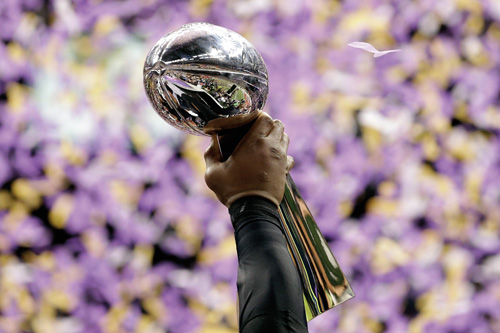
Tax break for a big-money business
The NFL isn’t the only professional sports league whose central office avoids taxes. The National Hockey League, Professional Golf Association, Ladies’ Professional Golf Association and Association of Tennis Professionals enjoy the same exemption.
Major League Baseball was exempt until 2007, but gave it up when the IRS began requiring 501(c)(6) nonprofits to disclose the salaries of executives making more than $150,000 a year. The National Basketball Association has never been tax-exempt.
But football has become the national game, and the NFL gets the most attention. Former Sen. Tom Coburn’s annual “Wastebook” noted in 2012 that the NFL generated about $9 billion in revenue from television, licensing, ticket sales and merchandising in 2010. The league’s central office reported receiving $326 million in dues from its 32 teams on its 2012 tax forms.
By comparison, NHL revenue is expected to hit $3.7 billion this year, according to a June report in the Sports Business Journal. The PGA generated close to $2 billion in 2011, an association spokesman told Forbes.
Coburn, who retired in December, dislikes the NFL’s tax carve-out. “I don’t think a pro sports league ought to be a nonprofit,” the Oklahoma Republican said, “because they’re in it for profit.”
Taxpayers may be losing more than $91 million a year in taxes from the NFL and NHL, Coburn estimated.
The former senator takes umbrage particularly over Commissioner Roger Goodell’s $44 million salary. “As a salary?” he asked. “Running a nonprofit? I don’t see that as justifiable, I don’t see it as explainable. What they’re doing is hiding costs that are otherwise business expenses.”
Gregg Easterbrook wrote in 2013’s The King of Sports: Football’s Impact on America that the NFL’s tax status benefits the league at the expense of everyone else.
“The insertion of ‘professional sports leagues’ into the Internal Revenue Code definition of not-for-profit organizations was a transparent sellout of the public interest,” Easterbrook wrote. “This lobbyist-written phrase has saved the NFL hundreds of millions of dollars in tax obligations, which means either that average people must pay higher taxes or the national debt must be increased.”
Coburn in 2013 introduced the Properly Reducing Overexemptions for Sports Act, or PRO Sports Act, which would block professional sports organizations from filing as 501(c)(6) organizations if they take in more than $10 million a year. Rep. Jason Chaffetz, R-Utah, introduced companion legislation in the House in early 2014.
“In reality, the NFL and the NHL are for-profit businesses, and they should be taxed as such. They are not charities nor are they traditional trade organizations like local chambers of commerce,” Chaffetz said at the time.
He noted that his intent was not to generate more money for the government but to lower tax rates and broaden the tax base. “Closing this loophole should be combined with closing several other loopholes in order to lower tax rates in a revenue-neutral manner,” he said. Chaffetz’s office declined to comment further.
Rep. Dave Camp, the Michigan Republican who was chairman of the House Ways and Means Committee until he retired at the end of the last Congress, also sought to eliminate the tax exemption for professional sports leagues in the 979-page tax-reform proposal he announced last month.
The NFL referred to a 2013 op-ed by Jeremy Spector, an outside tax counsel for the NFL and partner at law firm Covington & Burling, who defended the central office’s tax exemption.
The NFL acts as a trade association for the clubs and should be categorized as such by the IRS, Spector wrote. “The league office is the administrative and organizational arm of the NFL and does things like write the rules of the game, hire referees, run the college draft, negotiate the collective bargaining agreement with the players, conduct player safety research, and run youth football programs.
“Every dollar of income that is earned in the National Football League — from game tickets, television rights fees, jersey sales and national sponsorships — is subject to tax,” he wrote. “None of this income is shielded in a tax-exempt entity.”

Ray Rice incident draws criticism
But it’s not just the issue of taxes that has drawn attention to the NFL.
On Sept. 8, the morning after the Baltimore Ravens’ first regular-season game, the TMZ website released surveillance film from February showing Baltimore Ravens star running back Ray Rice knocking out his fiancee, Janay Palmer, with a punch in an elevator at the Revel Casino in Atlantic City, N.J.
By the time the video came out, Rice had already been accepted into a pretrial program for first-time offenders and had received a two-game suspension as punishment from the NFL. These sanctions had been imposed when the only video the public had seen was of the football player dragging an unconscious Palmer out of the elevator. Subsequent footage showing the actual knockout blow, played and replayed by news networks and on websites, stoked public outrage and brought accusations that Rice had gotten away with a slap on the wrist.
Anger escalated when Goodell told CBS’ Norah O’Donnell that he had not seen video of the actual punch until TMZ posted it, but was contradicted the next day when the Associated Press reported that an unidentified law officer claimed he sent the video to the NFL in April.
With the NFL accused of trying to cover up or downplay Rice’s offense, uproar ensued on Capitol Hill. On the day of the AP report, 12 Democrats on the House Judiciary Committee wrote a letter to Goodell demanding transparency in the NFL’s investigation of the incident. A day later, 16 female Democratic senators wrote to Goodell to “call on the NFL to institute a real zero-tolerance policy for domestic violence that will ensure that this type of violence and abuse has no place in the NFL.”
Sen. Richard Blumenthal, D-Conn., went further, calling for Goodell’s resignation. “The current leadership of the NFL cannot be trusted to fairly, genuinely implement policies that address domestic violence,” he said.
The NFL reacted to the growing furor by making Rice’s suspension indefinite; the Ravens tore up his contract. One week later, Sen. Cory Booker, D-N.J., introduced a bill to end the league’s tax exemption and allocate the revenue to domestic violence prevention programs.
Rep. Jackie Speier, D-Calif., also called for Goodell to resign and pushed for the House Oversight Committee to hold a hearing. “The NFL’s failure to appropriately respond to crimes and misconduct has harmed the prestige of the game and the millions of Americans who look up to these players as role models,” she said.
Committee Chairman Darrell Issa, R-Calif., did not hold hearings on the Rice incident. The office of Chaffetz, the new chairman of the oversight committee, would not say what investigations it intended to hold.
The Senate Commerce Committee held a hearing in December, giving senators a chance to unload on the NFL. Sen. John Thune, R-S.D., called the league’s handling of Rice “completely inadequate,” and Sen. Claire McCaskill, D-Mo., declared that “the status quo is not acceptable.”
At the hearing, Troy Vincent, the NFL’s executive vice president of football operations and a former player, called the league’s initial two-game suspension of Rice a “crucial mistake.”
“I don’t think there was a need for a second video to impose a proper discipline,” Vincent said. He broke down in tears describing how he witnessed repeated domestic violence in his home as a child, and outlined the league’s intent to change its handling of domestic violence.
Even before the punch video came out, the NFL was facing enough pressure over Rice’s two-game suspension that it had written a new domestic violence policy in August. The new rules included a six-game suspension without pay for the first offense and a ban of at least one year for a second offense.
The league brought in Mueller, the former FBI director, to lead an independent investigation of its handling of the Rice incident. Mueller’s 96-page report “found no evidence that anyone at the NFL had or saw the in-elevator video before it was publicly shown,” but it did chastise the league for its handling of the case.
“The NFL should have done more with the information it had and should have taken additional steps to obtain all available information about the Feb. 15 incident,” Mueller said.
Mueller did not interview editors at the Associated Press or the source who provided information to them about the existence of the videos.
Rice appealed his indefinite suspension and was reinstated by the league in late November, but he did not sign with a new team.
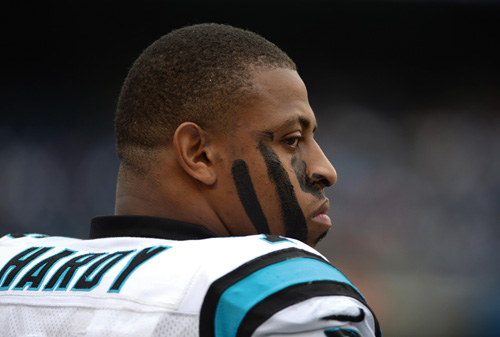
It’s a violent game
Outrage over Rice drew public attention to the NFL’s handling of other domestic violence incidents.
In the same week that TMZ released the knockout video, Minnesota Vikings superstar Adrian Peterson, another running back, was indicted on child abuse charges for whipping his 4-year-old son with a switch. Peterson reportedly told police he gave his son a “whooping” as punishment for pushing another child while they were playing. He pleaded no contest in a plea agreement that avoided jail time. The Vikings initially suspended him for one game, then placed him on the Exempt/Commissioner’s Permission List, a little-used option that keeps a player off a team’s roster indefinitely at the league’s discretion.
In July, Carolina Panthers defensive lineman Greg Hardy was convicted on charges of assaulting and threatening to kill his ex-girlfriend. Among other things, he was accused of throwing her onto a futon covered with rifles. Hardy appealed for a jury trial, which will take place this year. Despite his conviction, Hardy played in the first game of the 2014 season. But after the Rice case boiled over, the Panthers placed Hardy on the Exempt/Commissioner’s Permission List.
On Aug. 31, San Francisco 49ers defensive end Ray McDonald was arrested after being accused of domestic violence. In November, the Santa Clara, Calif., district attorney said no charges would be filed, citing lack of evidence. McDonald was not suspended and played the first 14 games of the season. But last month the San Jose Police Department began investigating McDonald after a woman accused him of sexual assault. The 49ers released him, citing his pattern of poor decision-making.”
Arizona Cardinals running back Jonathan Dwyer was arrested Sept. 17 after his wife told police he head-butted her and broke her nose and that she feared for their child’s safety. The Cardinals deactivated Dwyer immediately. Dwyer pleaded not guilty; his trial is scheduled for March.
These cases have prompted questions about the level of violence of NFL football, in which players are trained to hit each other hard. New Orleans Saints head coach Sean Payton was suspended for the 2012 season after the league determined that his players were paid bonuses for injuring opponents. Does that gladiator mentality carry over into life beyond the sport? Individual cases, such as the indictment of former New England Patriots player Aaron Hernandez on three murder charges, do not settle the issue one way or the other, but they do damage the sport’s reputation.
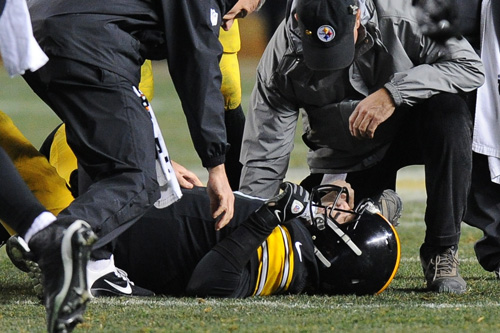
Concussions and suicide
Former players and the league are only now learning about the long-term concussions and brain damage caused by all the game’s hits. An actuarial report by the NFL filed in federal court in September said former football players in their 50s develop dementia and Alzheimer’s disease at a rate 14 to 23 times higher than the general population in that age group. The league says it expects nearly 30 percent of retired players to develop long-term cognitive damage, and that the conditions are likely to show up at younger ages than in the general population. There were 228 diagnosed concussions during preseason and regular-season games and practices in 2013, according to the NFL.
Several suicides of former football players have been linked to brain damage, including those of Junior Seau, Dave Duerson and Jovan Belcher, who killed his girlfriend and himself.
The NFL faced several hearings on concussions and brain safety, including one held by a House Energy and Commerce subcommittee and another hosted by the Senate Special Committee on Aging. There also have been a variety of lawsuits against the league, players union and even an individual team related to head injuries suffered while playing.
Americans are becoming more sensitive to the violence, with even President Obama saying that if he had a son, he would not let him play football.
The government’s interest in players’ long-term safety is expanding.
In November, the Drug Enforcement Administration conducted surprise inspections of some NFL teams who were playing road games as part of an investigation into whether teams distribute prescription painkillers illegally during games.
When the league began yet another season without a plan to act on its 2011 agreement to test for human growth hormone, Sen. John McCain said the failure “should be embarrassing to both owners and players” and said the NFL “must fulfill its responsibilities to set the standard for clean competition.”
But in a rare bit of positive feedback from Capitol Hill, after the league reached a deal to implement testing two weeks into the season, bipartisan plaudits followed from House Oversight Committee leaders Issa and Elijah Cummings, D-Md. “This new HGH policy sends a clear message to NFL players … that HGH and other performance-enhancing drugs are highly dangerous and will not be tolerated in athletic competition,” they said. The two had previously slammed the league in an op-ed for not reaching a deal sooner.
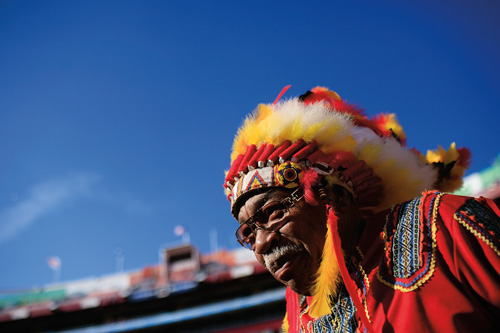
What’s in a name?
Meanwhile, a decades-old controversy over the Washington Redskins’ name has been gaining momentum, not least because it has been given several pushes by government officials. And the league’s tax exemption is being used as a weapon to force the team to adopt a new monicker.
In a February letter to Goodell from Sen. Maria Cantwell, D-Wash., then chairwoman of the Senate Indian Affairs Committee, and Rep. Tom Cole, R-Okla., a member of the Chickasaw tribe, the lawmakers disputed Goodell’s claim in an interview before the Super Bowl that the Redskins name is “presented in a way that honors Native Americans.”
“For you to pretend that the name is defensible based on decade-old public opinion polling flies in the face of our constitutionally protected government-to-government relationship with tribes,” the letter said.
Cantwell and Cole stopped short of a direct threat but made it clear they had the NFL’s tax status in their sights: “It is not appropriate for this multibillion-dollar 501(c)(6) tax-exempt organization to perpetuate and profit from the continued degradation of tribes and Indian people.”
Three months later, in the wake of the NBA’s swift rebuke of Los Angeles Clippers owner Donald Sterling over secretly recorded remarks that many people deemed to be racist, 50 Senate Democrats wrote Goodell demanding the league act to change the Redskins’ name.
“Now is the time for the NFL to act,” the letter said. “The Washington, D.C., football team is on the wrong side of history.”
In July, the U.S. Patent and Trademark Office canceled some of the team’s trademarks on the basis that the name is “disparaging to Native Americans.” The team is challenging the ruling in federal court.
In September, Cantwell followed through on her threat, introducing legislation that would revoke the NFL’s tax-exempt status if it continued to back the Redskins’ name. “American taxpayers should not be forced to subsidize a $9 billion league that promotes a dictionary-defined racial slur,” Cantwell said in announcing her bill.
“Our tax code should not be doling out tax breaks to organizations that perpetuate the use of racist slurs,” said Sen. Tim Johnson, D-S.D., a co-sponsor of the legislation.
In a piece of good news for the team, the Federal Communications Commission last month dismissed a lawsuit that urged the agency to take away the broadcast license for a radio station co-owned by team owner Daniel Snyder because of broadcaster’s repeated use of the term “Redskins”. Two similar challenges by Native Indians have been withdrawn, but the FCC has not ruled on the one remaining petition. FCC Chairman Tom Wheeler has called the team name “offensive and derogatory.”
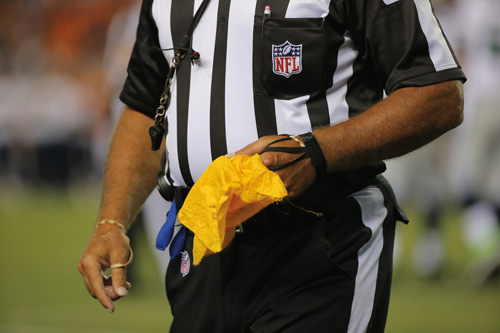
Seeing red over blackouts
While not as important as players’ health or racial issues, the league’s television blackout policy has also been a target of Congress. The rule, that a game cannot be televised in the place it is being played unless all tickets are sold 72 hours before it starts, often means that when a game is close to selling out, a local business group or even the team itself will purchase any remaining tickets so local fans can see the game on TV.
Last January, three playoff games were nearly blacked out because bone-chilling winter weather had frozen ticket sales. It was only after an Indianapolis retailer, a Cincinnati grocer and a group of Green Bay businesses stepped in to buy the unsold tickets, after a 24-hour extension of the deadline, that their cities were able to watch the games.
The FCC enforced the policy until September, when its commissioners voted to repeal it. “The NFL should no longer be able to hide behind government rules that punish loyal fans,” the FCC’s Wheeler wrote in a September op-ed.
The FCC’s move was symbolic, as the league can still write the policy into its television contracts. But in a December hearing of the Senate Judiciary Committee, Blumenthal pushed the league to repeal its rule.
“The country affords these teams their special status because of their special role in American culture,” the Connecticut Democrat said. “But that doesn’t give them the right to abuse this privilege, and the government certainly shouldn’t endorse abusive behavior.”
McCain noted that the rule allows teams to set ticket prices as high as they like, knowing the blackout threat increases the chances of a sellout. “The simple fact is that these rules only serve to benefit sports leagues and their member teams at the expense of the hardworking fans who support them so loyally through their money, time and passion,” said the Arizona Republican.
Blumenthal and McCain have pushed for passage of the Furthering Access and Networks for Sports (FANS) Act, a 2013 bill they co-authored that would end the NFL’s antitrust exemption — which makes it legal for the NFL to negotiate television deals on behalf of all its teams — if the league kept its blackout policy. Incoming Senate Judiciary Chairman Chuck Grassley, R-Iowa, has indicated he will consider the bill.
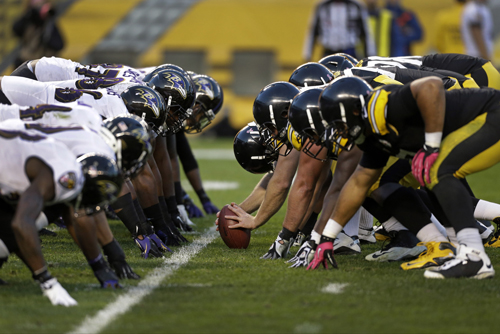
Whose business is it anyway?
Lawmakers have long summoned sports stars to Capitol Hill to testify about the latest league outrage.
In perhaps the best-known hearing of the 2000s, after a 2005 memoir in which former baseball star Jose Canseco admitted taking steroids and accused other stars of doing the same, the House Oversight Committee called Canseco, Mark McGwire, Sammy Sosa and other sluggers to ask them about their experiences with drugs. More hearings followed in subsequent years, including a highly publicized one in 2008 in which pitcher Roger Clemens and his former trainer, Brian McNamee, clashed over details of what Clemens used, and when.
Since 2003, congressional committees have called Goodell or other NFL representatives to testify at seven hearings about performance-enhancing drugs, and another five hearings since 2009 on head injuries and player safety.
But the outrage over the NFL’s tax-exempt status and multiple controversies is not dying this time. And calls for change aren’t coming only from elected officials. A Change.org petition called “Revoke the Tax-Exempt Status of the National Football League” has gathered more than 425,000 signatures since September 2012.
A September article posted on Slate.com called for the league to lose its 501(c)(6) status, saying, “NFL’s head office has long been allowed to operate as a tax-exempt nonprofit — as if its sole purpose for existence wasn’t to extract wads of cash from the wallets of American sports fans.”
In an opinion piece published in the New York Times in September, Ryan Alexander, president of Taxpayers for Common Sense, said the NFL should not benefit from public coffers, writing, “At no time would continuing the tax-exempt status of professional sports leagues be good policy. At a time of sky-high deficits and debts, continuing this policy is inexcusable.”
In his book, Easterbrook wrote that the NFL’s status is “troubling not just because average people are taxed to provide subsidies, and special government favors are granted so a small number of NFL owners and their families can live in great wealth, as modern feudal lords and ladies. It is troubling because athletics are supposed to set an example — and the example being set is one of selfishness. Football is America’s game. Should the favorite sport of the greatest nation on Earth really be one whose economic structure is based on inequality and greed?”
Sports lawyer Darren Heitner doubts such tongue-lashings will have much long-term effect on the NFL’s popularity. “From a broad perspective, that scrutiny that comes up every so often is probably worth it if the league can save millions of dollars every year,” he said.
“I think that the politicians who are talking about doing this are really grandstanding,” said Andrew Zimbalist, economics professor at Smith College. “I don’t think there’s anything substantial here. If they want to go after NFL profits, there’s a much more direct and reasonable way to do that.”
Neither Heitner nor Zimbalist believes the NFL would lose much money if it shed its 501(c)(6) status. “The NFL has very expensive accountants on retainer,” Heitner said. “I think with a little ingenuity, it would be possible to show that not only does the NFL not make all that much money, but from the league’s standpoint, potentially takes a loss.”
Zimbalist agreed. “If the IRS says to them or Congress says to them, ‘You can’t be a nonprofit anymore,’ ” he said, “what they would be able to do is simply distribute more to the teams or pay themselves higher salaries, and make any profits disappear from the central office. It would have no impact.”
Indeed, when Major League Baseball gave up its tax status, executives described the move as “tax-neutral” for the league.
Zimbalist said he doesn’t think Congress has a legitimate case to alter the league’s tax status. “I think it would be foolish for them to do it. The NFL central office is just a pass-through organization,” he said. “It is, in fact, a nonprofit, the central office.”
He noted that if Congress believes the NFL should pay more in tax, it could target tax shelters for team owners or tax-exempt bonds for financing stadiums.
“Making threats or proposing legislation that takes away tax-exempt status for the central office — maybe it appeals to some of their constituents, but it’s really neither logically a rational way to go about it nor practically the most direct and effective way to tax football.”
